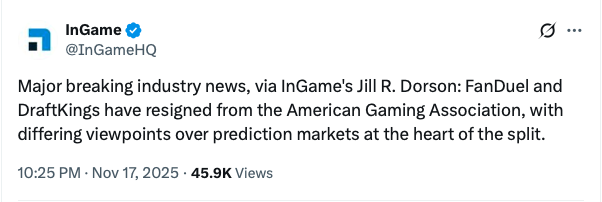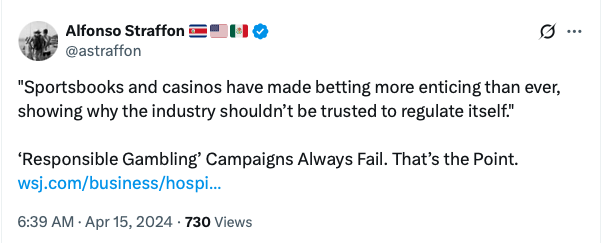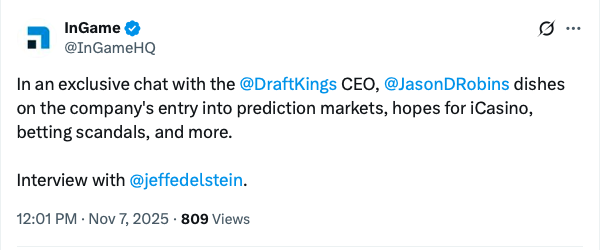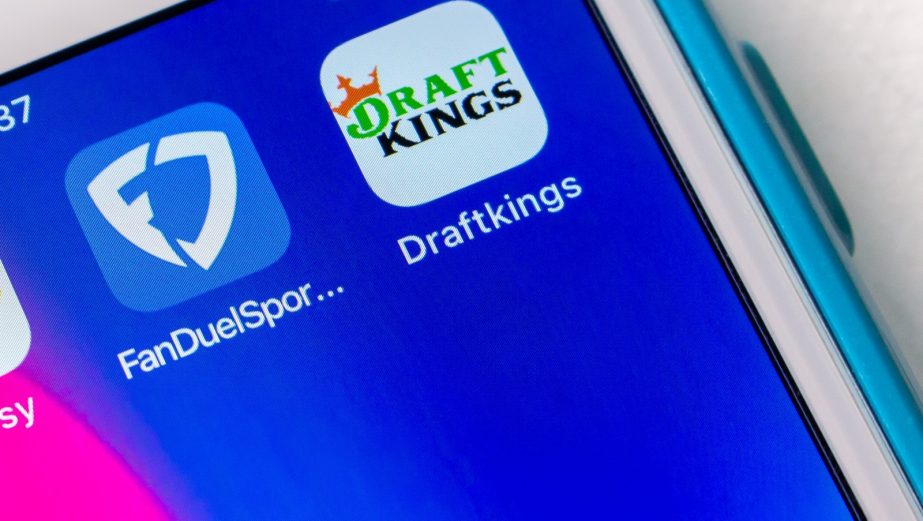A funny thing happened at the American Gaming Association’s (AGA) Public Policy Committee meeting in Washington Monday. DraftKings and FanDuel walked in as members. By cocktail hour — literally, and I hope they at least got a drink or two in — they were out.
The split came down to prediction markets, according to our own reporting. Clearly, the legacy casino companies (as well as those that also participate in online sports betting and casino) that make up the AGA’s core membership hate the existence of prediction markets, and DraftKings and FanDuel are now diving into the vertical headfirst.

One of the reasons the AGA opposes prediction markets is because they have zero responsible gambling requirements. The reason for that is simple: They’re not classified as “gambling” in the first place. They are derivatives markets. And I ask: When was the last time you saw a disclaimer saying “if you are buying too much crappy stock and need help, call this 800 number” at the end of a Schwab ad?
So now, it’s going to be up to the sports betting companies — whose own responsible gambling efforts are, let’s be honest, pretty questionable (or “dead,” as I once put it) — to import some safeguards into a space that’s currently operating with the thinnest of safety nets.
“I think prediction markets should have the same protections in place as online sportsbooks,” Keith Whyte, founder and president of Safer Gambling Strategies, told me. “Frankly, if anyone is going to operate prediction markets, it should be gambling companies.”
Wait, what?
It’s linguistics
Before we go further, let’s talk about what prediction markets actually offer in terms of safeguards.
Take Kalshi. Its website has a section called “Responsible Risk Management.” (A rose by any other name, wink-wink nudge-nudge.)
And here’s what Kalshi offers: Users can enable a trading break, set up a voluntary opt-out, or create a personalized funding cap. All of these are “accessible risk management tools that can be enabled at their discretion.”
Notice anything? It’s all on the user. Trading break? You have to set it. Funding cap? You have to impose it on yourself. Voluntary opt-out? The word “voluntary” is right there in the name.
There’s no practical difference between “responsible gambling” and “responsible risk management” — it’s the same activity with a fresh coat of paint. But there’s a massive difference between what Kalshi offers and what state-regulated sportsbooks are, in many cases, required to provide.
And even with regulated operators following rules … there will be holes. For instance, when I recently martingale’d my Cash Eruption Slingo and blackjack losses well past $200 when my normal spend is 20-cent bonus spins, I didn’t get a single message from the online operator asking if I was OK. The responsible gambling tools that are supposed to catch me tilting out? They caught nothing. As such, I stand by what I wrote a year ago: Responsible gambling, as currently constructed, is dead.

But at least those tools exist. At least there’s supposed to be someone or something watching. With prediction markets? There’s no one watching at all. It’s just you, your credit card, and a risk management section at the bottom of your profile page.
No thanks
The departures of FanDuel and DraftKings from the AGA underscore a new, clear divide in legal sports betting. Legacy casino operators like Caesars, MGM, and Penn Entertainment want nothing to do with prediction markets. Tech companies like DraftKings, FanDuel, PrizePicks, and Underdog are now all in.
It makes sense when you think about it. Casino companies have hundreds of millions in physical assets, thousands of employees, and deep relationships with state regulators. Tech companies are nimble, mostly online, and apparently growing increasingly comfortable with the idea of navigating federal regulation via the Commodity Futures Trading Commission (CFTC) instead of dealing with 50 different state gaming commissions.
The AGA has been, I reckon, walking a tightrope on this issue, with some members opposed and others ready to launch. The AGA can now lobby against prediction markets with everything it has, and DraftKings and FanDuel can pursue their plans without the awkwardness of being in a trade group actively working against their interests.
“As the company’s business strategy evolves — including with prediction markets — DraftKings determined that its plans no longer fully align with the AGA’s direction in certain areas,” a company spokesperson told InGame Monday night.
Translation: We’re doing this, and you can’t stop us, and goodbye.
Two paradigms, one problem
Prediction markets and sports betting are forming two completely different paradigms around the same activity: risking money on uncertain outcomes. (A rose by any … etc., and so forth.)
If you lose money on a prediction market, the framing is: You sought to make an investment and engage in good faith in financial markets. Your savings have been reduced, but perhaps you just need to get better at prognostication. Maybe read some whitepapers. Diversify your portfolio of election contracts and Taylor Swift rankings on Spotify and how long Mr. Beast’s next video will be.
But if you lose money at a sportsbook, the framing is: You are an addict and a loser and you need help.
When someone loses their shirt day-trading GameStop on Robinhood, we don’t require the platform to send them educational materials about responsible investing. But if I bet $200 on the Jets? Well, that’s a gambling problem.
There’s no difference, is what I’m saying.
Where this leaves RG
“The National Council on Problem Gambling found a big overlap between weekly gamblers and weekly traders,” Whyte, the former executive director of the NCPG, said. “And frequency is associated with problems. There are definite concerns, though there’s no real research yet because it’s too new.”
Whyte’s core argument gets counterintuitive here. Despite all the problems with responsible gambling in sports betting — and there are many — he thinks the gambling companies are still the best hope for bringing any meaningful safeguards to prediction markets.
“They started out 30 years ago just like Kalshi, with responsibility solely on the individual,” Whyte said. “But they’ve realized there are strong ethical and economic reasons to do good responsible gambling. And they have the tools in place.”
DraftKings CEO Jason Robins told me earlier this month that the company plans to bring its responsible gambling framework to prediction markets, likely rebranding it as “responsible trading.”
“We’re strong believers in responsible play for sports betting and iGaming, and we’ll bring that to prediction markets,” Robins said. “We’ll leverage the same tools we already have. It’s really just repurposing them for this product, not reinventing the wheel.”

That’s reassuring, I guess? Except the wheel they’re repurposing doesn’t exactly work so great in the first place. And yet, it’s still miles ahead of what platforms like Kalshi currently offer, which is essentially nothing unless you decide to protect yourself.
Still, Whyte’s point stands: better the companies with some framework, however flawed, than companies with none. Kalshi, Polymarket, and Crypto.com didn’t grow up in the gambling world. They don’t have responsible gambling departments or decades of regulatory relationships. They’re treating this like a tech product, but tech products don’t typically come with the risk of financial ruin.
What happens next
No one knows where any of this is headed. Court cases are pending in multiple states. Some regulators have sent cease-and-desist letters. Nevada has banned prediction markets.
But the genie’s out of the bottle. Prediction markets are live everywhere else. Underdog and PrizePicks are already out there. FanDuel and DraftKings are weeks away.
And all of a sudden, it’s on the sportsbooks to drag their kind of “meh” responsible gambling infrastructure into prediction markets, because without them, there’s nothing there at all except a user-initiated “risk management” page that might as well say, “good luck, pal.”
If you thought responsible gambling was in rough shape before, buckle up. It’s about to get a whole lot more complicated.







